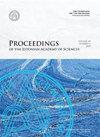青少年特发性关节炎患儿家长应对儿童疾病的经验与需求
IF 0.7
4区 综合性期刊
Q3 MULTIDISCIPLINARY SCIENCES
引用次数: 0
摘要
. 儿童中最常见的风湿病是幼年特发性关节炎(JIA)。在疾病开始时,父母的主要情绪是日益增长的焦虑、恐惧、困惑和否认疾病。在爱沙尼亚,患有JIA儿童的父母没有得到足够的支持,也没有得到关于其儿童健康问题或社会福利和服务的信息。本文的目的是描述JIA患儿的父母在应对患儿疾病方面的经验和需求。研究的设计是定性和描述性的。数据采用半结构化访谈法收集,并采用归纳内容分析法进行分析。访谈于2021年进行,共有8名受试者参与了研究。本研究的作者发现,父母应对孩子疾病的经验包括对疾病的适应、父母对孩子处境的感受、家庭关系、疾病的性质和各种支持机制。在疾病初期,他们经历了恐惧和焦虑。父母的需求与支持孩子应对疾病、治疗过程和学校要求有关。为了做到这一点,家长们寻求心理帮助。在治疗过程中,随着病情的加重,家长配合医护人员的意愿也越来越强烈。教师需要更多地了解由于儿童残疾造成的障碍和限制。总之,在适应孩子的疾病时,父母经历了积极和消极的感受,以及缺乏信息。家庭应该感受到医疗保健专业人员、当地市政当局和教育机构的支持。本文章由计算机程序翻译,如有差异,请以英文原文为准。
The experiences and needs of parents of children with juvenile idiopathic arthritis in coping with the child’s disease
. The most common rheumatological disease in children is juvenile idiopathic arthritis (JIA). At the beginning of the disease, the predominant emotions of the parents are growing anxiety, fear, confusion and denial of the disease. In Estonia, parents of children suffering from JIA do not receive enough support and information about their child’s health problem or social benefits and services. The aim of the thesis is to describe the experiences and needs of parents of children with JIA in coping with the child’s disease. The design of the research is qualitative and descriptive. The data were collected through semi-structured interviews and ana - lysed by the inductive content analysis method. The interviews were carried out in 2021 with eight subjects participating in the research. The authors of this research found that the parents’ experiences in coping with the child’s disease consisted of adaptation to the disease, feelings of the parents regarding their child’s situation, family relations, nature of the disease and various support mechanisms. At the beginning of the disease, fear and anxiety were experienced. The needs of parents were related to supporting the child’s coping with the disease, the treatment process and school requirements. In order to do that, parents sought psychological help. Regarding the treatment process, the parents’ desire to cooperate with healthcare workers grew as the disease exacerbated. More understanding was needed from teachers regarding the obstacles and limitations due to the child’s disabilities. In conclusion, when adapting to the child’s disease, parents experienced both positive and negative feelings as well as a lack of information. Families should feel supported by healthcare professionals, local municipality and educational institutions.
求助全文
通过发布文献求助,成功后即可免费获取论文全文。
去求助
来源期刊

Proceedings of the Estonian Academy of Sciences
综合性期刊-综合性期刊
CiteScore
1.80
自引率
22.20%
发文量
24
审稿时长
>12 weeks
期刊介绍:
The Proceedings of the Estonian Academy of Sciences is an international scientific open access journal published by the Estonian Academy of Sciences in collaboration with the University of Tartu, Tallinn University of Technology, Tallinn University, and the Estonian University of Life Sciences.
The journal publishes primary research and review papers in the English language. All articles are provided with short Estonian summaries.
All papers to be published in the journal are peer reviewed internationally.
The journal is open to word-wide scientific community for publications in all fields of science represented at the Estonian Academy of Sciences and having certain connection with our part of the world, North Europe and the Baltic area in particular.
 求助内容:
求助内容: 应助结果提醒方式:
应助结果提醒方式:


